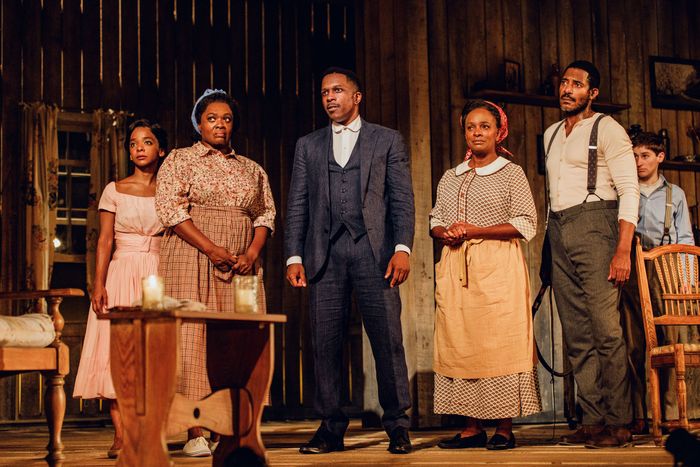
At the Music Box Theatre, the house lights fade and a recording of director Kenny Leon’s voice welcomes us to the show — so far, so standard. But this announcement goes on to do more than ask us to turn off our cell phones. Leon lets us know that this production is the first major revival of Ossie Davis’s Purlie Victorious since its 1961 Broadway run. (The last time New York saw the writer-director-actor-activist’s play, Ringo hadn’t yet joined the Beatles.) Then Leon asks us to “lean in”: He tells us that this play is built on both humor and rage and that we should sit forward, get set, and open ourselves up to both. Finally, he asks, spread the word — if we like it, we should ’gram it, TikTok it, tell a friend! And if we don’t, we should keep our mouths shut.
That joke’s a golden oldie, but it tends to crop up at the end of fringe shows. What’s happening in this big commercial house is subtle but striking: The production is both setting its terms — in a climate of distraction and disruption, it is explicitly asking its audience to know what we’re showing up for and to show up for it — and confessing its vulnerability. Every piece of theater that’s not a product of the Disneyverse feels like an especially perilous leap of faith these days, even amid the affluence of Broadway. It requires the kind of spirit that animates both Davis’s protagonist and his audaciously funny firecracker of a play: “that divine impatience without which nothing truly good, or truly bad, or even truly ridiculous, is ever accomplished in this world.”
Happily, I have no need to keep my mouth shut about Purlie Victorious. (Conveniently, too, since my job is to run it constantly.) Fast, fierce, and big-hearted, the show crackles with the verve of its central performances, and the play, at 62 years old, feels wittier, braver, less careful, and more caring than much contemporary writing. Both unflinching and generous, it’s just about as sharp as satire gets.
Set in the Jim Crow South of the late ’50s or early ’60s (“Time: The recent past,” says the script), Purlie follows the story of a magnetic aspiring preacher, Purlie Victorious Judson. His name is pronounced like pearly, and he’s played with sparkling showmanship by Hamilton’s Tony- and Grammy-winning Aaron Burr, Leslie Odom Jr. Purlie has just blown back through the doors of his childhood home in Georgia with a cunning plan. He’s going to buy the town’s old church, Big Bethel, set up shop in its pulpit, and liberate his friends and neighbors from the tyranny of Ol’ Cap’n Cotchipee (Jay O. Sanders), the linen-wearing, whip-wielding landowner in the big white house up the hill who has essentially re-enslaved the local sharecroppers through debt and who lives his life according to the credo “God is still a white man.” Crucial to Purlie’s scheme are his brother, Gitlow (Billy Eugene Jones); his sister-in-law, Missy (Heather Alicia Simms); and especially the young protégée he has taken under his wing, Lutiebelle Gussie Mae Jenkins (Kara Young). Plucked from a junior choir in Alabama and spirited back to Georgia, Lutiebelle is the key to Purlie’s whole enterprise. She’s supposed to impersonate his dead cousin Bee, for whom Ol’ Cap’n is holding a $500 inheritance in trust. “Freedom, Missy, that’s what Big Bethel means,” Purlie rhapsodizes in the face of his sister-in-law’s hesitation. “For you, me, and Gitlow. And we can buy it for $500, Missy. Freedom! You want it, or don’t you?”
Davis originated the role of Purlie himself, alongside his multi-hyphenate wife, Ruby Dee, as the hopeful, seemingly hapless Lutiebelle. The ceaseless bravado of both roles isn’t just impressive; it’s radical, and it’s moving. When the industry was still casting Black actors as maids and bellhops, Davis crafted an extraordinary pair of characters for himself, his partner, and teams of actors to come (though given the play’s long hibernation, not nearly enough of them). Odom and Young leap into their parts with the trust and panache of a couples trapeze act. Unsurprisingly, Odom’s got charisma for days, and this time, he’s playing a character who’s not seething and contained like Burr. He’s hardly ever still, darting and dancing across the stage, a man ablaze with vision — a man we’re delighted to believe when he insists, “I ain’t never in all my life told a lie I didn’t mean to make come true, some day!” We somehow don’t resent him at all (though we may laugh at him a little) when he turns to the starry-eyed Lutiebelle in a moment of soaring rhetorical passion and pops, well, a question: “There’s something I want to ask you — something I never — in all my life — thought I’d be asking a woman — would you — I don’t know exactly how to say it — would you … Would you be my disciple?”
Another Lutiebelle might have found herself lost underneath the laugh this line gets. But not Kara Young. Yes, Odom gets the entrance applause, and yes, he could charm the shell off a snail, but Young is the real revelation of the show. Her Lutiebelle, fantastically funny and completely rooted, is the kind of performance young actors should study. She’s got heavyweight-class comedic chops — the way she flicks her wide-eyed gaze from target to target, the way her voice jumps and dives and cracks, the brilliantly warped gait she adopts when, while wearing Cousin Bee’s fancy, constricting duds, she tries to waltz her way out of Ol’ Cap’n’s commissary with $500. (It’s as if she’s doing Blanche DuBois while trying to carry an invisible pineapple between her knees.) It’s challenge-level clowning and all the more impressive because it’s so grounded, so full of intense intention and need. Young creates a woman who’s essentially sitting on top of a geyser: There’s the decorous mask she has been trained to present, especially to white folks like her former employer Miz Emmylou, and then there are the absolute torrents of awe, desire, and her own divine impatience that rumble under the surface, shooting out in rainbows every time they find a crack. That “Would you be my disciple” line? It’s great — and what’s even greater is the ecstatic basso profundo in which Young’s Lutiebelle responds, her whole body vibrating from the root chakra outward, “Oh yes, Reb’n Purlie, yes!!!”
Performances like Young’s and Odom’s would go a long way toward carrying any show, but here, they’re far from alone in making Davis’s text sing and dance. Leon’s whole ensemble is aces — from the hulking, roaring, sputtering Sanders (particularly good when he plays up what a needy child Ol’ Cap’n really is) to Noah Robbins as Charlie Cotchipee, the well-meaning kid Ol’ Cap’n acknowledges with chagrin as “my boy, my own lily-white, Anglo-Saxon, semi-Confederate son,” who has somehow managed to hold on to a conscience. Heather Alicia Simms and Vanessa Bell Calloway are both sharp, witty, and poignant without sentimentality as the play’s two matriarchal figures, the formidable Missy Judson and Idella Landy, the wry, worldly-wise housekeeper who essentially raised Charlie. And as Gitlow Judson, Billy Eugene Jones is doing extraordinarily committed, gutsy, and delicate work in what may be the play’s toughest role. Gitlow’s name is a harsh pun: His particular role — both in Purlie’s scheme and in his own daily life for reasons of subversion and survival — is to dance attendance on Ol’ Cap’n. “Always so high and mighty,” he launches at Purlie in a moment of defiance. “Don’t pay no ’tention to Gitlow; naw — he’s a Tom. Tease him — low-rate him — laugh at ol’ Gitlow; he ain’t nothing but a fool!” A part like Gitlow is explosive material. It’s funny as hell and no laughing matter, and Jones threads that needle with utmost grace. There’s a bit of singing in his part, and it turns out he also has a gorgeous voice. (In 1970, there was a musical adaptation of Purlie, and something tells me a lot of this cast would probably be just as at home in full song as they are in Davis’s buoyant, melodic text.)
Purlie shares a good deal of DNA with the best of the fast-talking, vaudeville-inspired plays and films of the 1930s and ’40s — the dialogue whizzes and twinkles, and the physical comedy demands both scale and agility. Leon keeps it flying along at a gallop, fast enough that you have to lean in, and the list of why-don’t-they-write-jokes-like-this-anymore moments is long. A taste: As Lutiebelle picks her way through the minefield of reciting Cousin Bee’s past in front of Ol’ Cap’n, she flubs a part of it — “But Henrietta had already died, herself: largely from smallpox.” “No!” hisses Purlie behind her, and she course-corrects with a rictus grin: “Smally from large pox?”
Good satire also has to sting, and the show’s laughter never lets us off the hook. It’s just that, when it comes down to it, the play doesn’t worship a god of anger. In a lot of ways, Purlie is a trickster story, which means it runs on a combination of brains, guts, and charisma; its deities are Anansi and Coyote and Br’er Rabbit; and it was probably always destined to offend the congenitally serious. Looking back on his play several decades later, Davis wrote that even his dearest friends were far from united over it. Some, he recalled, felt Purlie was “condescending, if not demeaning,” that “the cause was serious, and laughter was the last thing we needed … White folks already looked upon us as a race of clowns [and] what we needed from the theater was not buffoons but heroes hurling invectives … a play with characters speaking manfully of our anguish … To them, humor was not a weapon; it was rather a confirmation of our cowardice.”
But courage has many faces, and a revolution takes all sorts — and one made up only of unsmiling soldiers is likely to lead only to war. What Davis summoned with Purlie, and what Leon’s revival makes joyously clear, is a different kind of divinity. When Purlie says he has never told a lie he didn’t mean to make come true, he isn’t just cracking wise. He is, just as Lewis Hyde describes in his marvelous study Trickster Makes This World, opening a door. “Trickster,” writes Hyde, “isn’t a run-of-the-mill liar and thief. When he lies and steals, it [is] to disturb the established categories of truth and property and, by so doing, open the road to possible new worlds.”
Purlie Victorious is at the Music Box Theatre.





